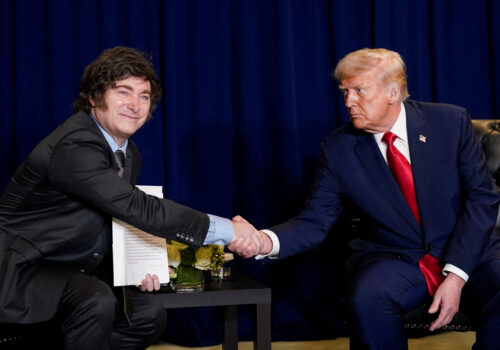Milei just got a midterm boost. What’s next for Argentina?
GET UP TO SPEED
The vote is in, and with it a mandate. The party of Argentine President Javier Milei grew its share of seats in Congress in Sunday’s midterm elections, defying expectations and giving a boost to Milei’s aggressive economic reforms. The result comes on the heels of a major US intervention to prop up the shaky Argentine peso, which US President Donald Trump had tied to his backing of Milei’s chainsaw-wielding, inflation-fighting agenda. What’s next from Milei and the markets? Invest some time in our expert takes below.
- Alejo Czerwonko: Member of the Adrienne Arsht Latin America Center’s Advisory Council and the managing director and chief investment officer emerging markets Americas for UBS Global Wealth Management
- Jason Marczak (@jmarczak): Vice president and senior director of the Adrienne Arsht Latin America Center
- Valentina Sader (@valentinasader): Deputy director at the Adrienne Arsht Latin America Center
- Martin Mühleisen (@muhleisen): Nonresident senior fellow at the GeoEconomics Center and former International Monetary Fund official
Behind the results
- Milei’s party, La Libertad Avanza (LLA), captured more than 40 percent of the vote, more than doubling its share of seats in Congress. “The scale of Milei’s victory sits at the most optimistic end of pre-election expectations,” Alejo tells us. “His party now holds the political capital needed to accelerate structural reforms.”
- Jason notes that the “most surprising” result was LLA’s narrow win over the rival Peronist party in Buenos Aires Province, “where, less than two months ago, a 14-percentage-point loss in provincial elections rattled markets” and seemed to portend a poor midterm result for Milei.
- One factor that “likely figured into the size of LLA’s victory,” Jason says, was the backing of the Trump administration, via a twenty-billion-dollar currency swap line and another twenty-billion-dollar loan instrument that could be used to purchase Argentine debt. Sunday’s results, Jason adds, “will give reassurances to the US administration of its backing of Milei’s economic reforms.”
- But Jason points out “one notable and concerning sign” coming out of the elections. Voter turnout was only 67.9 percent, “the lowest since the county’s return to democracy,” Jason notes.
- Still, Valentina says Argentines gave Milei a vote of confidence: “This electoral outcome is a clear answer to those questioning the political viability of Milei’s plan and the willingness of the Argentine people to endure the pain of some of these reforms.”
Sign up to receive rapid insight in your inbox from Atlantic Council experts on global events as they unfold.
Market moves
- Argentina’s bond markets had been wobbly in recent weeks as Milei’s political fortunes seemed to suffer. But now, Martin tells us, “Markets are likely to swing strongly in Argentina’s favor over the coming days, boosting the exchange rate and allowing the government to resume the accumulation of foreign exchange reserves, and interest rates should also decline markedly.”
- Alejo notes that “Argentina’s ‘country risk’—the spread its US dollar sovereign bonds pay over US Treasuries—was at distressed levels” before the election, with investors expecting a poor LLA performance. But “Argentine risk assets should now benefit from greater political stability, a renewed push for pro-market reforms, and robust support from the US.”
Milei’s checklist
- So what will the next phase of Milei’s reforms look like? Alejo predicts “an ambitious deregulation agenda,” along with “labor, tax, and potentially social security reforms” and changes to Argentina’s foreign exchange policies.
- While Argentina could allow for some meaningful depreciation in the days ahead, Martin expects the government to “still be hesitant to float the peso—meaning allow it to move with the market—for good, which would be necessary for the exchange rate to find a more stable long-term equilibrium.”
- Martin notes that while LLA does not have an outright majority in Congress, it will have an easier time building legislative majorities for certain policy moves and blocking any big spending plans. He advises Milei to “use this political and economic window of opportunity” to advance the “structural transformation of the economy” and ensure that promises lead to results for growth and jobs.
- “After all,” Martin says, “Argentina still has a long way to go to remove the vestiges of Peronism from its economy, starting with labor market rigidities and a large pension cost overhang.”
- The midterm result suggests Milei has a strong chance of re-election in two years, which won’t be lost on lawmakers. “Success breeds success,” Martin says. “It is this dynamic that should work in Milei’s favor while he continues on his difficult and often painful reform path.”
Further reading
Thu, Oct 23, 2025
Milei’s economic plan meets its midterm test
New Atlanticist By Ignacio Albe
Argentinians head to the polls on October 26, and the outcome could determine the future of President Javier Milei’s efforts to reform the country’s economy.
Tue, Sep 30, 2025
Is the US currency rescue for Argentina positive statecraft or reckless favoritism?
New Atlanticist By Martin Mühleisen
A twenty-billion-dollar US support package for Argentina announced last week provides crucial breathing room for President Javier Milei.
Wed, Apr 16, 2025
Four questions (and expert answers) about Argentina’s new $20 billion financial rescue
New Atlanticist By Martin Mühleisen, Jason Marczak
What exactly did the IMF agree to, and what is required of Argentina? Our experts dive into the deal and map what comes next.
Image: Argentina's President Javier Milei celebrates after the La Libertad Avanza party won the midterm election, which is seen as crucial for Milei's administration after US President Donald Trump warned that future support for Argentina would depend on Milei's party performing well in the vote, in Buenos Aires, Argentina, October 26, 2025. REUTERS/Cristina Sille


